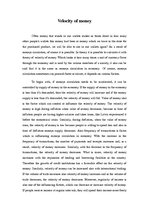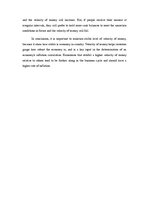If people receive income at regular intervals, they will spend their income more freely and the velocity of money will increase. But, if people receive their income at irregular intervals, they will prefer to hold more cash balances to meet the uncertain conditions in future and the velocity of money will fall.
In conclusion, it is important to maintain stable level of velocity of money, because it show how stable is economy in country. Velocity of money helps investors gauge how robust the economy is, and is a key input in the determination of an economy's inflation calculation. Economies that exhibit a higher velocity of money relative to others tend to be further along in the business cycle and should have a higher rate of inflation.
…
Often money that stands in our wallets makes us think about in how many other people's wallets this money had been or money which we leave in the store for the purchased product, we will be able to see in our wallets again? As a result of moneys circulation, of course it is possible. In theory it is possible to calculate it with theory of velocity of money. Which looks at how many times a unit of currency flows through the economy and is used by the various members of a society, it also can be said that it is the same as moneys circulation in economy. Of course, moneys circulation sometimes can proceed faster or slower, it depends on various factors. To begin with, if moneys circulation needs to be accelerated, it can be controlled by supply of money in the economy. If the supply of money in the economy is less than it’s demanded, then the velocity of money will increase and if the money supply is less than it’s demanded, the velocity of money will fall. Value of money also is the factor which can control or influence the velocity of money. The velocity of money is high during inflation when value of money decreases, because in time of inflation people are having higher salaries and takes loans, like Latvia experienced it before the economical crisis.



